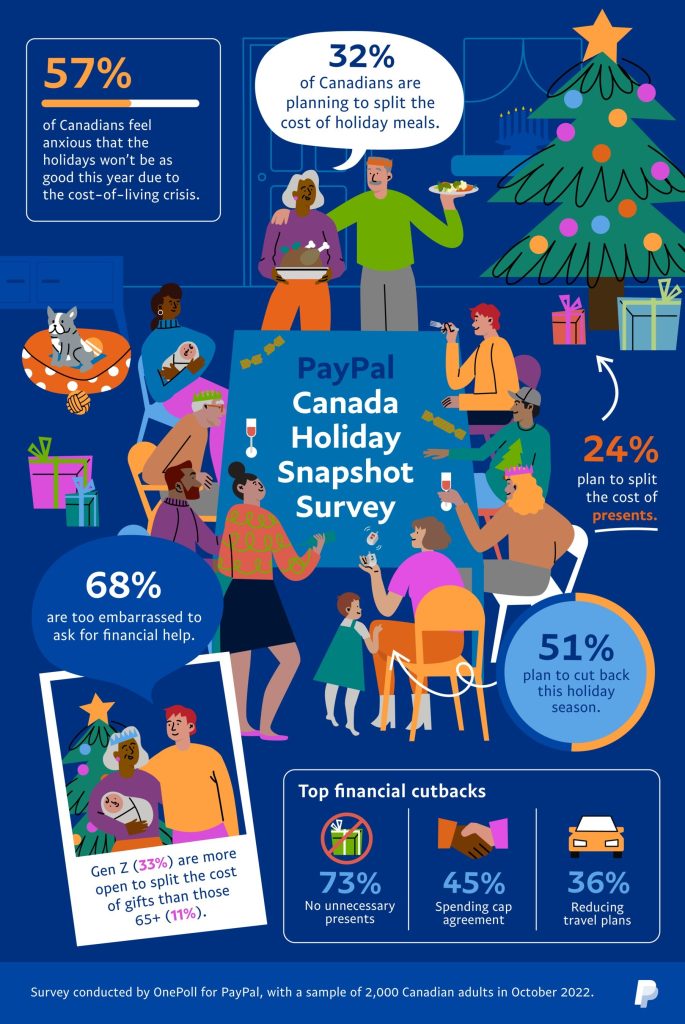- Nearly three out of five Canadian respondents (57%) feel anxious that the holidays won’t be as good this year due to the cost-of-living crisis
- One in two Canadian respondents (51%) will be making cutbacks this holiday season
- Two in five Gen Z say they will offer to chip in for festivities at their parents (45%) and grandparents (43%)
At a time when Canadians should be looking forward to the holidays, many are looking closely at their wallets instead. A new survey released today by PayPal Canada found two in three Canadian respondents (66%) report feeling financial pressures this year. PayPal Canada’s 2022 Holiday Snapshot Survey polled 2,000 Canadians and found seven in ten respondents (68%) would be too embarrassed to ask for financial help with splitting the cost of celebrations.
Which generation is more open to splitting costs?
Heartwarmingly, Gen Z respondents report being three times as likely (33%) to split the cost of gifts this year than those 65 and over (11%). The younger generation still want to do their part. Two in five Gen Z respondents say they will offer to chip in for festivities at their parents (45%) and grandparents (43%) as they feel the older generations would be too proud to ask for money.
Consumers are considerate when asking for help
When it comes to asking others for help, Canadians are thoughtful about how it might affect others. The top reason survey respondents are too embarrassed to ask friends and family to chip in for seasonal festivities is because they believe others are struggling financially too (66%). Other reasons include to avoid others worrying (52%) or having too much pride to ask for financial support (35%).
Furthermore, the survey revealed 16 per cent of respondents would feel bad about owing people money if asked to divvy up spending and 15 per cent are concerned that cost-splitting requests will dampen the festive mood.
Finding cost savings
To keep budgets under control, half of Canadian respondents (51%) admit they’ll be making financial cutbacks this holiday season, specifically in British Columbia (53%), Alberta (52%), Ontario (51%) and Quebec (48%). Top cutbacks include:
- Avoiding purchasing unnecessary presents (73%)
- Having a spending cap agreement with family and friends (45%)
- Limiting travel plans (36%)
- Entertaining fewer people (32%)
- Asking guests to bring dishes to gatherings (27%)
However, Canadians will not go for the lower price tag on their search to find the perfect gift for loved ones. Over half of respondents (53%) do not plan to reduce their spending when it comes to buying for family and friends – even if it means they must knock a few items off their own wish list.
Cost sharing is digital
Despite hesitancy over splitting costs, the findings reveal bill-splitting with family and friends is happening online, with one in three Canadian respondents (35%) saying they would transfer money through a banking app. Other ways respondents plan to divide costs include asking someone to buy a specific item (18%), paying someone back with cash (15%), and transferring money via digital payment services (6%). What’s more, 45 per cent of respondents say they would be open to hearing about new digital ways to split costs as they navigate ongoing economic uncertainty.
“Sharing the load and splitting costs with friends and family can be a difficult conversation, especially for Canadians who want to be thoughtful about others and their financial situation,” said Malini Mitra, Director, Communications, PayPal Canada. “Money management and splitting costs with family and friends is a difficult conversation. At PayPal, we’re committed to helping people share costs with our send and request money features and PayPal.me, a personalized web link that can be shared to make bill splitting a lot easier and less awkward this holiday season.”
Head to the PayPal website for more information on easy and efficient cost-splitting solutions for the festive season, such as PayPal.me.
Survey Methodology
PayPal Canada’s 2022 Holiday Snapshot Survey was conducted online by OnePoll, which surveyed 2,000 Canadian respondents. The survey took place in the last week of October, 2022.
